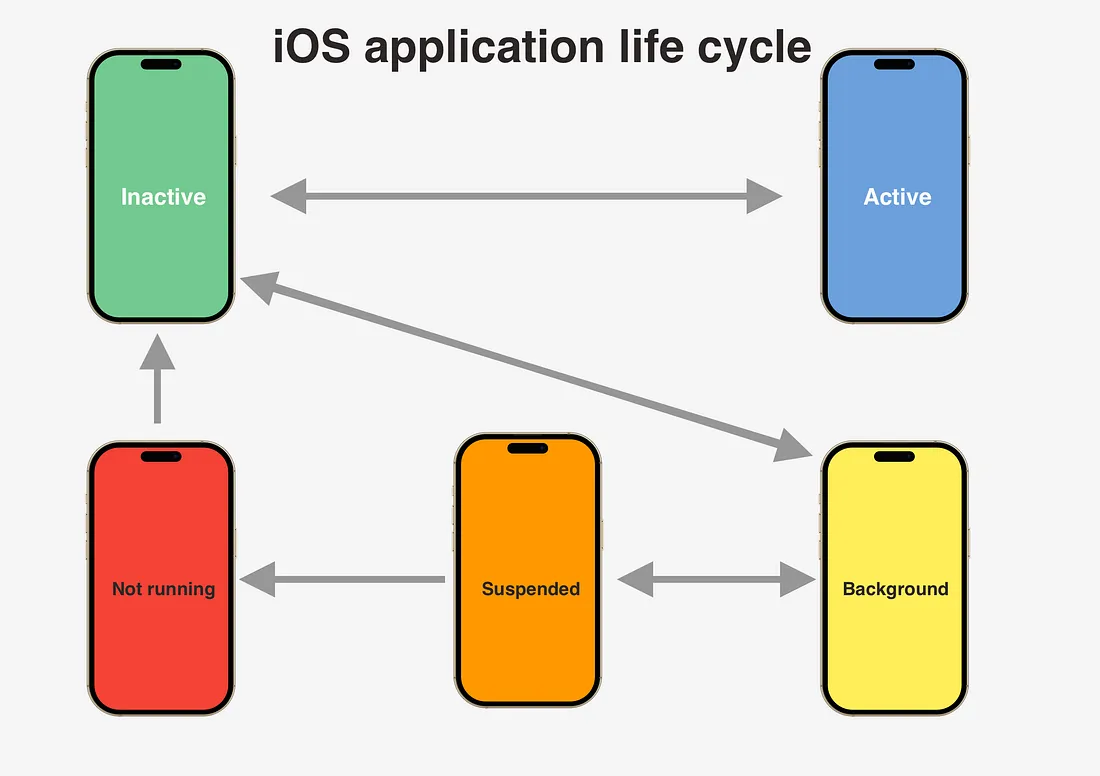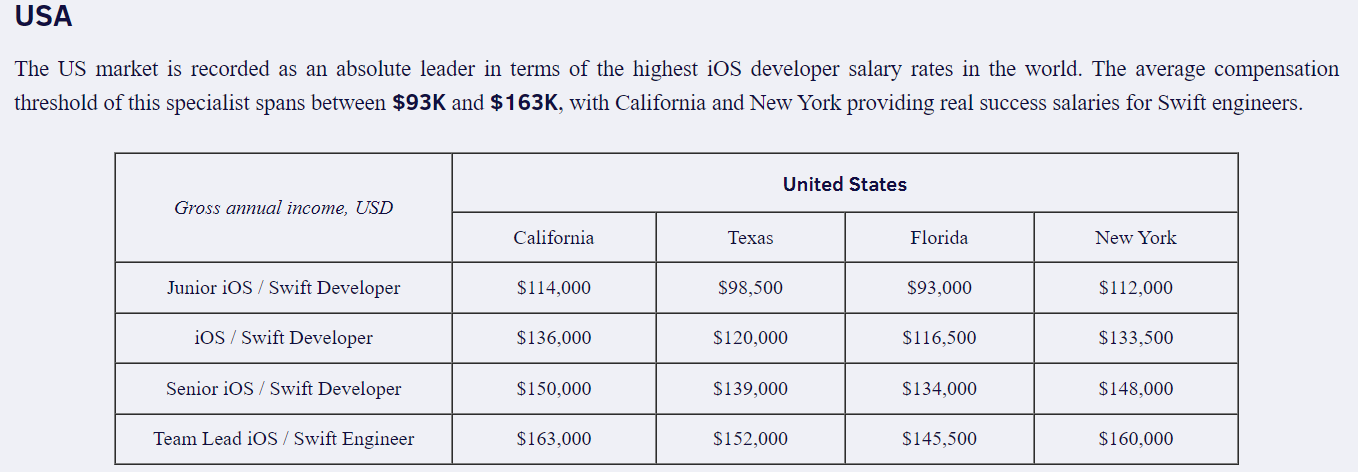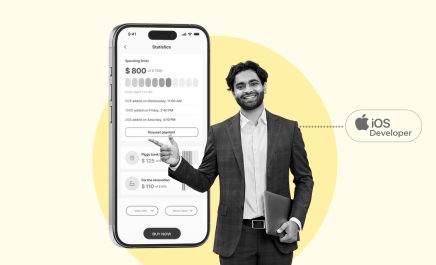8 Red Flags to Watch Out for When Hiring iOS Developers
- Sathvik Poojary
- July 24, 2024
- 6 Minute Read

With 2.2 billion active Apple devices globally, the iOS platform offers a tremendous chance for businesses to connect with a large and involved audience.
To capitalize on this opportunity, businesses need a strong presence in the App Store, which offers a wide variety of 3.84 million apps. Yet, excelling in this fierce environment necessitates exceptional skills in iOS development. Experienced iOS developers are more than just programmers; they are valuable allies who can turn a concept into a strong, user-focused app.
Identifying and addressing common red flags during the hiring process is crucial to ensuring your project is entrusted to competent individuals. Insufficient experience, ineffective communication, or lack of technical knowledge can greatly disrupt a project. Furthermore, inconsistencies in problem-solving skills, comprehension of the app lifecycle, and cultural alignment may result in unexpected difficulties.
This blog addresses mobile app developers hiring challenges and goes more in-depth on these crucial factors, enabling you to make informed choices when you want to hire iOS developers.
Lack of Relevant Experience
Specialized knowledge is needed to understand the unique nuances of the iOS ecosystem, including design guidelines and performance optimization. An iOS developer with a solid history is more inclined to create a top-notch app that meets Apple’s standards and user needs.

When assessing a possible iOS developer, examine projects showcasing skills in key iOS frameworks such as UIKit for creating user-friendly interfaces and Core Data for effective data handling.
Candidates must demonstrate a solid understanding of Swift, the main language, and must be familiar with incorporating functionalities such as live chat through WebSocket or Push Notifications.
Having experience with ARKit for augmented reality or Core ML for machine learning is advantageous for apps that require advanced features. Additionally, having a sharp sense of design is essential, as demonstrated by the developer’s commitment to following Apple’s Human Interface Guidelines (HIG).
To measure a developer’s market comprehension, evaluate their familiarity with App Store Optimization (ASO) and how past projects influenced app rankings.
Questions to Assess Experience During an Interview
Below are some questions you can ask to learn more about the candidates’ experience.
- Could you share your experience creating applications within our industry or with similar functionalities?
- How well do you know the most recent iOS versions, frameworks, and design guidelines?
- Could you explain how you tackle a technical problem involving iOS development?
- Have you ever worked with App Store Optimization (ASO)? What is your strategy for enhancing the visibility of our app?
- What is your method for staying current with the latest developments in the iOS ecosystem?
By thoroughly reviewing a developer’s portfolio and posing appropriate inquiries, you can improve your likelihood of discovering an iOS developer who is an expert and has the experience needed to realize your app concept.
Poor Communication Skills
An invaluable developer can communicate ideas, attentively listen to client feedback, and give prompt updates. Effective communication helps avoid confusion, promotes project coordination, and encourages teamwork.
While being a good communicator is important, it is just as crucial to identify signs of ineffective communication abilities. Some examples of these could be:
- Failure to respond promptly or delayed replies may indicate a lack of dedication or coordination.
- Misinterpreting requirements often indicates communication problems and possible delays.
- A developer who patiently waits for client queries may not be assuming responsibility.
- Difficulty in simplifying technical concepts impedes client engagement.
To assess a developer’s communication skills, analyze how well they can clearly explain technical concepts, actively listen, and consistently provide updates. Evaluate their promptness, conflict resolution skills, and ability to relate application features and advantages.
Watch how they work together with the team and how they can simplify technical problems into easily understandable explanations.
Inadequate Technical Skills
While strong iOS developers should possess a solid foundation in Swift and Objective-C, the ability to leverage Apple’s powerful frameworks is crucial. For instance, a developer struggling to implement Core Data functionalities for managing app data raises concerns about their competency in essential iOS development tools.
Testing technical proficiency involves coding challenges, portfolio reviews, and technical interviews. Red flags include difficulty with basic coding concepts, lack of knowledge about recent iOS updates, or an inability to explain technical decisions.
Unimpressive Portfolio
An unimpressive portfolio poses serious hiring challenges. A strong iOS developer portfolio should showcase various projects demonstrating proficiency in different app types.
For instance, a portfolio lacking apps that leverage core iOS features like UIKit for building user interfaces, might indicate limited iOS development experience.
Additionally, a portfolio devoid of projects showcasing adherence to Apple’s Human Interface Guidelines (HIG) suggests a potential lack of attention to detail and user experience.
Lack of Problem-Solving Abilities
Strong problem-solving skills enable developers to find creative solutions, adapt to changes, and deliver high-quality apps. To assess problem-solving abilities, present candidates with real-world iOS development scenarios.
For instance, a challenge like optimizing app performance when dealing with large datasets or implementing a complex UI feature within design constraints. Evaluate their approach, reasoning, and potential solutions.
Red flags include a tendency to rely on simplistic solutions, an inability to break down complex problems into smaller components, or a lack of creativity in exploring alternatives.
For example, a developer who proposes a brute-force solution to a performance optimization issue without considering data structures or algorithms demonstrates limited problem-solving skills.
Poor Understanding of App Lifecycle and Updates

A developer’s grasp of the iOS app lifecycle is crucial for building robust and responsive applications. Understanding how an app transitions between states, from launching to backgrounding, is essential for managing resources, preserving user data, and ensuring a seamless user experience.
To assess a developer’s knowledge, inquire about their experience with lifecycle methods, state preservation, and background tasks. Give hypothetical scenarios to gauge their problem-solving abilities in handling lifecycle-related challenges.
Red flags include a lack of awareness of common lifecycle pitfalls, such as memory leaks or performance issues. Developers who struggle to explain the implications of different lifecycle states or propose ineffective solutions for handling state preservation may lack the necessary depth of understanding.
For instance, a developer unfamiliar with the concept of app termination and its impact on background tasks, or who suggests incorrect approaches for handling app state restoration, would indicate a poor understanding of the app lifecycle.
Cultural and Team Fit Issues
Cultural fit is essential for a successful iOS development team. A cohesive unit thrives on shared values, a collaborative spirit, and a willingness to learn from each other. During the interview, assess the candidate’s experience working in agile environments.
Is there comfort in collaborating with designers, project managers, and other developers? Do they actively seek feedback and openly share their ideas?
Their responses can shed light on their communication style and openness to collaboration. Additionally, explore how they handle challenges within a team. Do they approach problems with a team-first mentality, or do they tend to isolate themselves?
A strong team player will readily seek input from colleagues and value different perspectives in finding solutions.
Unrealistic Salary Expectations
Unrealistic salary expectations can derail the hiring process. Researching industry standards for iOS developers in your region is crucial.

Experience level, project complexity, and company size influence salary ranges. Red flags include candidates who significantly overestimate their worth without providing concrete justifications or those who are inflexible in negotiations.
Employers can set clear expectations during the initial contact, communicate the salary range upfront, and focus on the candidate’s value proposition rather than solely on salary. Emphasizing career growth opportunities, project scope, and company culture can help align expectations and build a mutually beneficial relationship.
Conclusion
Watch out for developers with limited iOS experience, poor communication skills, weak technical proficiency, unimpressive portfolios, or a lack of problem-solving abilities. Ensure they understand the app lifecycle, fit well with your team, and have realistic salary expectations.
By carefully evaluating these red flags throughout the hiring process, you can significantly increase your chances of finding the right iOS developer. Look for a candidate who not only possesses technical skills but also exhibits strong communication, problem-solving abilities, and a collaborative spirit.
Uplers meticulously matches you with the best professionals from its vast talent pool of highly skilled and qualified experts. Hire the top 3.5% AI-vetted iOS developers within 48 hours and enjoy up to 40% cost savings. Get in touch today!


Thank you for submitting the details!
We will keep your information safe. Feel free to contact us with any questions at hello@uplers.com
Please check your email for next steps shared by Robert.














